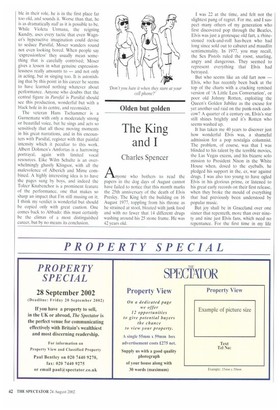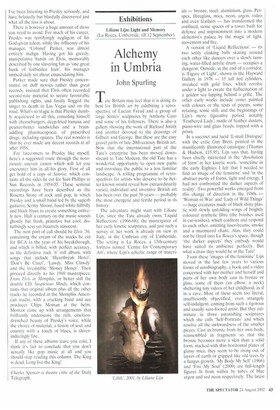The King and I
Charles Spencer
ble in their role, he is in the first place far too old, and sounds it. Worse than that, he is as dramatically null as it is possible to be. While Violeta Urmana, the reigning Kundry, uses every tactic that even Wagner's hyperactive imagination could devise to seduce Parsifal, Moser wanders round not even looking bored. When people say 'expressionless' they usually mean something that is carefully contrived; Moser gives a lesson in what genuine expressionlessness really amounts to — and not only in acting, but in singing too. It is astonishing that by this point in his career he seems to have learned nothing whatever about performance. Anyone who doubts that the central figure in Parsifal is Parsifal should see this production, wonderful but with a black hole in its centre, and reconsider.
The veteran Hans Tschammer is a Gurnemanz with only a moderately strong or beautiful voice, but he sings and acts so sensitively that all those moving moments in his great narrations, and in his encounters with Parsifal, register with that painful intensity which it peculiar to this work. Albert Dohmen's Amfortas is a harrowing portrayal, again with limited vocal resources. Eike Wilm Schulte is an overwhelmingly ghastly Klingsor, with all the malevolence of Alberich and Mime combined. A highly interesting idea is to have the pages sung by boys, and indeed the Tolzer Knabenchor is a prominent feature of the performance, one that makes so sharp an impact that I'm still musing on it; I think my verdict is wonderful but should be copied only with great caution. One comes back to Abbado: this must certainly be the climax of a most distinguished career, but by no means its conclusion,
Aiyone who bothers to read the papers in the dog days of August cannot have failed to notice that this month marks the 25th anniversary of the death of Elvis Presley. The King left the building on 16 August 1977, toppling from his throne as he strained at stool, bloated with junk food and with no fewer that 14 different drugs washing around his 25 stone frame. He was 42 years old. I was 22 at the time, and felt not the slightest pang of regret. For me, and I suspect many others of my generation who first discovered pop through the Beatles, Elvis was just a grotesque old fart, a rhinestoned rock-and-roll has-been who had long since sold out to cabaret and maudlin sentimentality. In 1977, you may recall, the Sex Pistols ruled the roost, snarling, angry and dangerous. They seemed to represent everything that Elvis had betrayed.
But who seems like an old fart now — Elvis, who has recently been back at the top of the charts with a cracking remixed version of 'A Little Less Conversation', or poor old Johnny Rotten, exploiting the Queen's Golden Jubilee as the excuse for yet another sad raid on the punk-rock cashcow? A quarter of a century on, Elvis's star still shines brightly and it's Rotten who seems washed up.
It has taken me 40 years to discover just how wonderful Elvis was, a shameful admission for a pop nostalgia columnist. The problem, of course, was that I was blinded to his talent by the terrible movies, the Las Vegas excess, and his bizarre solo mission to President Nixon in the White House when, dosed to the eyeballs, he pledged his support in the, er, war against drugs. I was also too young to have ogled Elvis in his glorious prime, or listened to his great early records on their first release, when they broke the mould of everything that had previously been understood by popular music.
But joy shall be in Graceland over one sinner that repenteth, more than over ninety and nine just Elvis fans, which need no repentance. For the first time in my life I've been listening to Presley seriously, and have belatedly but blissfully discovered just what all the fuss is about.
There is however a huge amount of dross you need to avoid. For much of his career, Presley was terrifyingly negligent of his God-given talent, while the influence of his manager, 'Colonel' Parker, was almost entirely malign. Having got his greedy, manipulative hands on Elvis, memorably described by one slavering fan as 'one great hunk of forbidden fruit', his manager immediately set about emasculating him.
Parker made sure that Presley concentrated on duff movies rather than great records, insisted that Elvis often recorded second-rate material to secure favourable publishing rights, and finally flogged the singer to death in Las Vegas and on the road. What's so tragic is that Presley dumbly acquiesced to all this, consoling himself with cheeseburgers, deep-fried banana and peanut-butter sandwiches and a brainaddling pharmacopoeia of prescribed drugs, including opiates. The real wonder is that he ever made any decent records at all after 1956.
For latecomers to Presley like myself, here's a suggested route through the notoriously uneven canon which will let you encounter him in all his glory. First of all get hold of a copy of Sunrise, which contains all the sides he cut for Sam Phillips at Sun Records in 1954-55. These seminal recordings have been described as the Rosetta Stone of rock and pop, in which Presley and a small band led by the superb guitarist, Scotty Moore, fused white hillbilly and black blues to create something entirely new. Half a century on the music sounds ghostly but fresh, primitive but cool, disturbingly sexy yet bizarrely innocent.
The next port of call should be Elvis '56, containing the cream of the tracks he cut for RCA in the year of his breakthrough, and which is billed, with perfect accuracy, as the definitive rock 'n' roll album, with songs that include 'Heartbreak Hotel', 'Don't Be Cruel', `Lawdy, Miss Clawdy' and the irresistible 'Money Honey'. Then proceed directly to his 1969 masterpiece, From Elvis in Memphis, or better still the double CD. Suspicious Minds, which contains that original album plus all the other tracks he recorded at the Memphis American studio, with a cracking band and ace producer Chips Moman at the helm. Moman came up with arrangements that brilliantly underscore the rich, emotiondrenched beauty of Presley's voice, while the choice of material, a fusion of soul and country with a touch of blues, is shiverinducingly fine.
If any of these albums leave you cold, I think it's fair to conclude that you don't actually like pop music at all and you should stop reading this column. The King is dead. Long live the King!































































 Previous page
Previous page